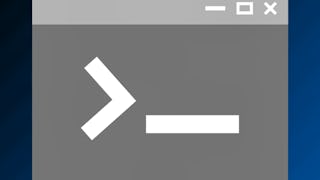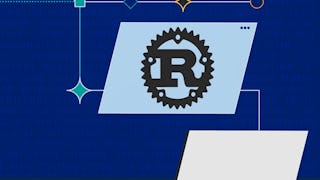This course is designed for beginners and those with some programming experience in either Python or Rust that want to implement automation and utilities in the command-line. Although no prior knowledge of Python or Rust is required, basic programming knowledge is recommended as well as some familiarity with the command-line interface (CLI). Throughout the course, you will gain a solid foundation for building efficient, reliable, and high-performance command-line tools that can help you automate tasks for data engineering, systems engineering, and DevOps. By completing this course, you will have the skills to develop and distribute sophisticated and efficient command-line tools.



Python and Rust with Linux Command Line Tools
This course is part of Rust Programming Specialization


Instructors: Noah Gift
1,875 already enrolled
Included with 
(13 reviews)
Recommended experience
What you'll learn
Build powerful command line tools in Rust and Python
Use Python with Rust for building powerful tools
Skills you'll gain
Details to know

Add to your LinkedIn profile
4 assignments
See how employees at top companies are mastering in-demand skills

Build your subject-matter expertise
- Learn new concepts from industry experts
- Gain a foundational understanding of a subject or tool
- Develop job-relevant skills with hands-on projects
- Earn a shareable career certificate

There are 4 modules in this course
This week, you will learn how to create a basic command-line tool in Python and Rust, handle command-line arguments and options, organize code into modules and packages, and implement logging and error handling. You will apply these skills by developing a command-line tool that accepts user input, uses modules to organize code, logs output, and handles errors gracefully. The tool will demonstrate your ability to build a functional CLI program using best practices covered this week.
What's included
25 videos13 readings1 assignment1 discussion prompt1 ungraded lab
This week, you will learn how to create command-line tools with subcommands, parse complex arguments, and incorporate environment variables in both Rust and Python. You will apply these skills by developing a fully-featured command-line tool that can handle subcommands, arguments, and environment variables in a user-friendly way. The tool will demonstrate your proficiency in organizing functionality, flexibly handling input, and integrating with the environment in Rust and Python.
What's included
21 videos13 readings1 assignment
his week, you will learn how to explore advanced PyO3 features such as handling exceptions, custom conversions, and utilizing attributes. You'll also delve into the best practices for mixing Rust and Python, and understand how Rust can be leveraged for CPU-bound operations in Python. Furthermore, you'll begin the process of converting Python scripts into command-line tools using Rust, and familiarize yourself with error handling and logging in Rust CLI applications. To apply what you've learned, you'll be assessed through a series of hands-on exercises, including: Implementing a Rust function with custom exception handling that can be called from Python. Converting a simple Python script into a Rust CLI tool, focusing on the first part of the conversion process. Writing a brief case study analysis on how Rust can optimize CPU-bound operations in a given Python project. By the end of this week, you'll have a solid understanding of advanced Rust and Python integration techniques.
What's included
21 videos9 readings1 assignment
This week, you will learn how to create, deploy, and manage AWS Lambda functions using Rust, leveraging the power and performance of the language for serverless architecture, and applying it by building a real-world Lambda function as a part of a distributed application.
What's included
21 videos14 readings1 assignment1 ungraded lab
Earn a career certificate
Add this credential to your LinkedIn profile, resume, or CV. Share it on social media and in your performance review.
Instructors

Offered by
Explore more from Software Development
 Status: Free Trial
Status: Free TrialEdureka

Duke University
 Status: Free Trial
Status: Free TrialDuke University
 Status: Free Trial
Status: Free TrialDuke University
Why people choose Coursera for their career





Open new doors with Coursera Plus
Unlimited access to 10,000+ world-class courses, hands-on projects, and job-ready certificate programs - all included in your subscription
Advance your career with an online degree
Earn a degree from world-class universities - 100% online
Join over 3,400 global companies that choose Coursera for Business
Upskill your employees to excel in the digital economy
Frequently asked questions
Access to lectures and assignments depends on your type of enrollment. If you take a course in audit mode, you will be able to see most course materials for free. To access graded assignments and to earn a Certificate, you will need to purchase the Certificate experience, during or after your audit. If you don't see the audit option:
The course may not offer an audit option. You can try a Free Trial instead, or apply for Financial Aid.
The course may offer 'Full Course, No Certificate' instead. This option lets you see all course materials, submit required assessments, and get a final grade. This also means that you will not be able to purchase a Certificate experience.
When you enroll in the course, you get access to all of the courses in the Specialization, and you earn a certificate when you complete the work. Your electronic Certificate will be added to your Accomplishments page - from there, you can print your Certificate or add it to your LinkedIn profile. If you only want to read and view the course content, you can audit the course for free.
If you subscribed, you get a 7-day free trial during which you can cancel at no penalty. After that, we don’t give refunds, but you can cancel your subscription at any time. See our full refund policy.
More questions
Financial aid available,

